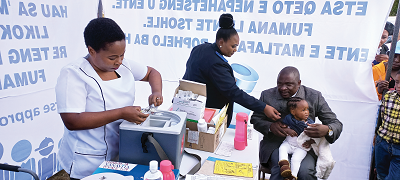By Thoboloko Nts’onyane
MAFETENG – The Minister of Health, Hon Selibe Mochoboroane had on Monday launched the African Vaccination Week at Thabana-Morena Clinic at Ha-Konote.
During this launch, he highlighted the need for increased vaccination efforts in the country.
He said the vaccinated children grow well.
Mochoboroane further urged the people to vaccinate against COVID-19 and those who still need to complete their vaccinations and take booster shots should do so.
The Minister expressed their intention to sponsor debates in high schools, with a central focus on prevention. They emphasized that strengthening health services should begin with prevention, as it is a crucial aspect.
Sister Likhabiso Theko announced their plan to vaccinate more than 660 children residing in nearby communities. She urged new mothers to bring their children for vaccinations, emphasizing the importance of disease prevention.
Sister Theko highlighted the vital role of village health workers (VHW) in primary healthcare and stressed the need for their ongoing training to ensure they can carry out their duties effectively.
Furthermore, Sister Theko acknowledged that their facility faces the challenge of being understaffed, requiring additional nurses and pharmacists. She added that the workload often becomes overwhelming while serving their patients.
First launched in 2014, this initiative aimed at increasing access to vaccines and raising awareness about the importance of immunization.
The week-long campaign runs from May 15-19.
For this year, African Vaccination Week and World Immunization Week, from 24–30 April, ran under the theme “The Big Catch-Up”.
African Vaccination Week is an annual event celebrated during the last week of April under the auspices of the World Health Organization (WHO).
It is implemented in African countries and it is among others envisaged to increase awareness of the importance of everyone’s “particularly children and woman” needs and the right to protection against vaccine-preventable diseases.
The Director of Primary Health Care (PHC) at the Ministry of Health (MoH) Dr ‘Makhoase Ranyali said the immunization campaign is rolled out in all the 10 districts.
WHO Lesotho Country Representative Dr Richard Banda said: “This initiative has proven to be particularly effective in bridging the vaccine access gap by reaching populations with limited access to regular health services.”
Dr Banda further mentioned that the immunization drive helps to integrate child survival interventions with immunization services.
The WHO Country Representative continued: “Vaccines are among the greatest advances in global health and development. Vaccines are the safest method to protect children from life-threatening diseases.
“Vaccines give every child the opportunity to grow up healthy and reach their full potential. African Vaccination Week showcases the importance of vaccines in all our lives, and how they protect us, young and old, against more than 25 vaccine-preventable diseases.
“For over two centuries, vaccines have safely reduced the scourge of diseases like polio, measles, and smallpox, helping children to grow up healthy and happy.”
He commended the government for joining the rest of the African region in commemorating the African Vaccination Week.
Dr Banda highlighted that this move also reflects on the gains the country has made in the past two years for the children. He pointed out that between 2021 and 2022, Lesotho has managed to sustain high coverage of under-five vaccination, and had jabbed at least over 80 percent in 7 out of the 10 districts despite the impacts of the COVID-19 pandemic.
“This shows that the country’s willpower and resilience in ensuring the health systems remain responsive particularly to children, even in adversity. Despite the gains, we need to appreciate our challenges. In Lesotho, we must work together to prevent frequent vaccine stock outs. Seven out of every 100 children miss getting vaccinated.
“We still fall short of the 90 percent coverage for essential vaccines given in childhood and adolescence, as is required by the Immunization Agenda 2030,” he said.
Some of the diseases that are vaccine-preventable and treatable include diphtheria, smallpox, measles, tetanus, rubella and yellow fever.
Children eligible for vaccination during this drive are from ages of five and under.


